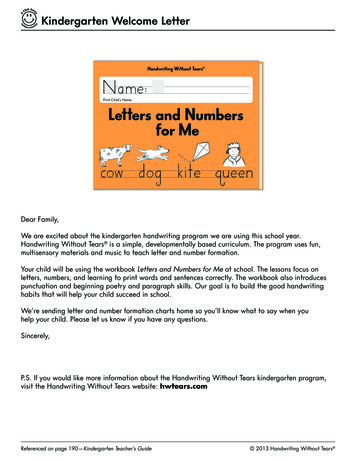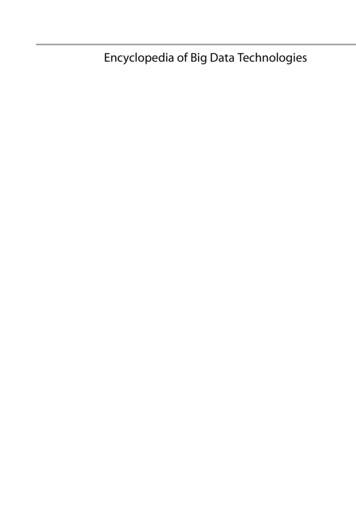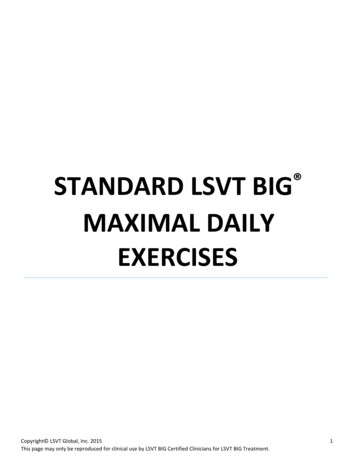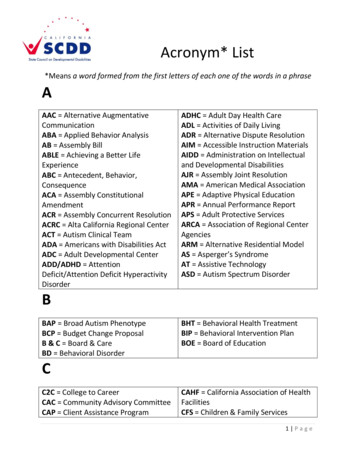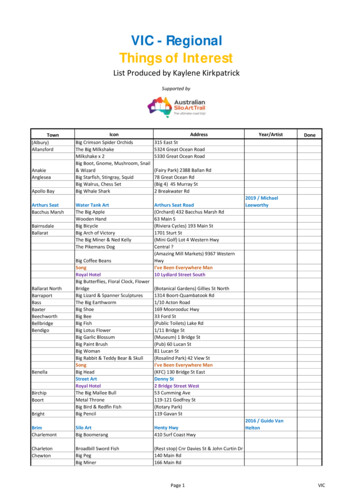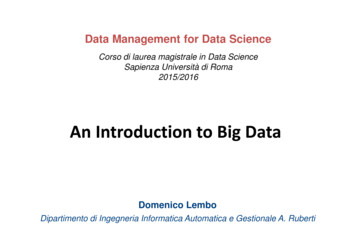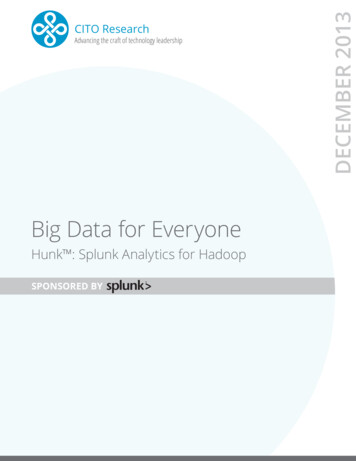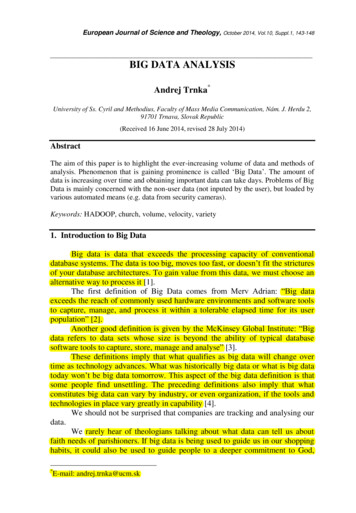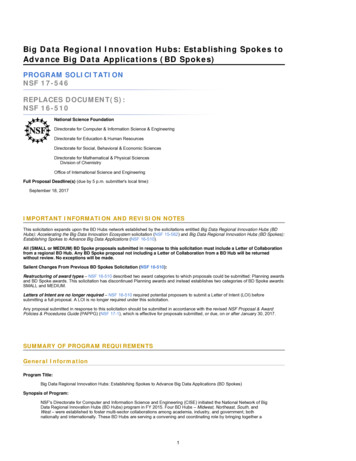
Transcription
Big Data Regional Innovation Hubs: Establishing Spokes toAdvance Big Data Applications (BD Spokes)PROGRAM SOLICITATIONNSF 17-546REPLACES DOCUMENT(S):NSF 16-510National Science FoundationDirectorate for Computer & Information Science & EngineeringDirectorate for Education & Human ResourcesDirectorate for Social, Behavioral & Economic SciencesDirectorate for Mathematical & Physical SciencesDivision of ChemistryOffice of International Science and EngineeringFull Proposal Deadline(s) (due by 5 p.m. submitter's local time):September 18, 2017IMPORTANT INFORMATION AND REVISION NOTESThis solicitation expands upon the BD Hubs network established by the solicitations entitled Big Data Regional Innovation Hubs (BDHubs): Accelerating the Big Data Innovation Ecosystem solicitation (NSF 15-562) and Big Data Regional Innovation Hubs (BD Spokes):Establishing Spokes to Advance Big Data Applications (NSF 16-510).All (SMALL or MEDIUM) BD Spoke proposals submitted in response to this solicitation must include a Letter of Collaborationfrom a regional BD Hub. Any BD Spoke proposal not including a Letter of Collaboration from a BD Hub will be returnedwithout review. No exceptions will be made.Salient Changes From Previous BD Spokes Solicitation (NSF 16-510):Restructuring of award types – NSF 16-510 described two award categories to which proposals could be submitted: Planning awardsand BD Spoke awards. This solicitation has discontinued Planning awards and instead establishes two categories of BD Spoke awards:SMALL and MEDIUM.Letters of Intent are no longer required – NSF 16-510 required potential proposers to submit a Letter of Intent (LOI) beforesubmitting a full proposal. A LOI is no longer required under this solicitation.Any proposal submitted in response to this solicitation should be submitted in accordance with the revised NSF Proposal & AwardPolicies & Procedures Guide (PAPPG) (NSF 17-1), which is effective for proposals submitted, or due, on or after January 30, 2017.SUMMARY OF PROGRAM REQUIREMENTSGeneral InformationProgram Title:Big Data Regional Innovation Hubs: Establishing Spokes to Advance Big Data Applications (BD Spokes)Synopsis of Program:NSF's Directorate for Computer and Information Science and Engineering (CISE) initiated the National Network of BigData Regional Innovation Hubs (BD Hubs) program in FY 2015. Four BD Hubs – Midwest, Northeast, South, andWest – were established to foster multi-sector collaborations among academia, industry, and government, bothnationally and internationally. These BD Hubs are serving a convening and coordinating role by bringing together a1
wide range of Big Data stakeholders in order to connect solution seekers with solution providers.In FY 2016, the Big Data Regional Innovation Hubs: Establishing Spokes to Advance Big Data Applications (BDSpokes) solicitation began extending the BD Hubs network by establishing multi-institutional and multi-sectorcollaborations to focus on topics of specific interest to a given region. The first set of BD Spokes was funded in FY2016. This solicitation calls for new BD Spoke proposals to be awarded in FY 2018. Collaborating with BD Hubs,each BD Spoke will focus on a particular topic that requires Big Data approaches and solutions. The set of activitiesmanaged by a BD Spoke will promote progress towards solutions in the chosen topic area. The regional BD HubSteering Committee will provide general guidance to each BD Spoke and will assist the BD Spoke in coordinatingwith the national BD Hub network, with other BD Spokes, and with the broader innovation ecosystem.The Big Data activities of a BD Spoke will be guided by the following broad themes:Accelerating progress towards addressing societal grand challenges relevant to the regional and nationalpriority areas defined by the BD Hubs (information on priority areas can be found on each Hub’s websitelisted in the Introduction section below);Helping automate the Big Data lifecycle; andEnabling access to and spurring the use of important and valuable available data assets, includinginternational data sets where relevant.NSF's overall Big Data research and development (R&D) portfolio includes fundamental research, infrastructuredevelopment and provisioning, education and workforce development, and community engagement. Not all of theseaspects of the overall portfolio are covered by this solicitation. In particular, this solicitation is not meant to fundproposals in which fundamental research is the primary activity. If research is a substantial portion of theproposed activities, please consult with a cognizant NSF program officer of this solicitation to help find a moreappropriate solicitation. For example, projects focused on foundations and innovative applications related to Big Datamay be better suited for submission to the Critical Techniques and Technologies for Advancing Foundations andApplications of Big Data Science & Engineering (BIGDATA) program. Similarly, projects focused primarily on privacyresearch may be more suited to NSF’s Secure and Trustworthy Cyberspace (SaTC) program.There are two proposal categories covered by this solicitation: SMALL and MEDIUM BD Spokes.All (SMALL or MEDIUM) BD Spoke proposals submitted in response to this solicitation must include a Letterof Collaboration from a regional BD Hub. Proposals not including a Letter of Collaboration from a BD Hubwill be returned without review. No exceptions will be made.Cognizant Program Officer(s):Please note that the following information is current at the time of publishing. See program website for any updates to the points ofcontact.Fen Zhao, Directorate for Computer and Information Science and Engineering, telephone: (703) 292-7344, email:fzhao@nsf.govEarnestine Psalmonds-Easter, Directorate for Education & Human Resources, telephone: (703) 292-8112, email:epsalmon@nsf.govCheryl L. Eavey, Directorate for Social, Behavioral, and Economic Sciences, telephone: (703) 292-7269, email:ceavey@nsf.govLin He, Directorate for Mathematical and Physical Sciences, telephone: (703) 292-4956, email: lhe@nsf.govSeta Bogosyan, Office of International Science and Engineering, telephone: (703) 292-4766, email: sbogosya@nsf.govDeborah Shands, Directorate for Computer and Information Science & Engineering, telephone: (703) 292-4505, email:dshands@nsf.govKenneth Whang, Directorate for Computer and Information Science and Engineering, telephone: (703) 292-5149, email:kwhang@nsf.govApplicable Catalog of Federal Domestic Assistance (CFDA) Number(s):47.049 --- Mathematical and Physical Sciences47.070 --- Computer and Information Science and Engineering47.075 --- Social Behavioral and Economic Sciences47.076 --- Education and Human Resources47.079 --- Office of International Science and EngineeringAward InformationAnticipated Type of Award: Standard Grant or Continuing GrantEstimated Number of Awards: 10 to 20BD Spoke awards -- Approximately 10 to 20 total awards across both the SMALL and MEDIUM categories are anticipated through thissolicitation.The total number of awards will be subject to the outcome of panel reviews and availability of funds.2
Anticipated Funding Amount: 10,000,000Each SMALL project will be funded at 100,000 to 500,000 total for up to three years, subject to the availability of funds.Each MEDIUM project will be funded at 500,001 to 1,000,000 total for up to three years, subject to the availability of funds.Eligibility InformationWho May Submit Proposals:Proposals may only be submitted by the following:Universities and Colleges - Universities and two- and four-year colleges (including community colleges)accredited in, and having a campus located in, the US acting on behalf of their faculty members. Suchorganizations also are referred to as academic institutions.Non-profit, non-academic organizations: Independent museums, observatories, research labs, professionalsocieties and similar organizations in the U.S. associated with educational or research activities.State and Local Governments: State educational offices or organizations and local school districts.Who May Serve as PI:There are no restrictions or limits.Limit on Number of Proposals per Organization: 1An organization may participate as submitting organization (or, in the case of collaborative proposals, as the leadorganization) for at most one proposal responsive to this solicitation.Proposal submissions are limited to 1 per organization (except as non-lead in a collaborative proposal) to maintain abalanced geographic representation of the Regional Hubs and Spokes program and to increase diversity ofparticipating institutions.Limit on Number of Proposals per PI or Co-PI: 1An investigator may participate as PI or Co-PI in no more than one proposal submitted in response to this solicitation,irrespective of proposal category. However, there is no limit on the number of proposals on which an individual mayserve as Senior Personnel.These eligibility constraints will be strictly enforced in order to treat everyone fairly and consistently. In theevent that an individual exceeds this limit, proposals received within the limit will be accepted based onearliest date and time of proposal submission (i.e., the first proposal received will be accepted and theremainder will be returned without review). No exceptions will be made.Proposal Preparation and Submission InstructionsA. Proposal Preparation InstructionsLetters of Intent: Not requiredPreliminary Proposal Submission: Not requiredFull Proposals:Full Proposals submitted via FastLane: NSF Proposal and Award Policies and Procedures Guide (PAPPG) guidelinesapply. The complete text of the PAPPG is available electronically on the NSF website at:https://www.nsf.gov/publications/pub summ.jsp?ods key pappg.Full Proposals submitted via Grants.gov: NSF Grants.gov Application Guide: A Guide for the Preparation andSubmission of NSF Applications via Grants.gov guidelines apply (Note: The NSF Grants.gov Application Guide isavailable on the Grants.gov website and on the NSF website at: https://www.nsf.gov/publications/pub summ.jsp?ods key grantsgovguide).B. Budgetary InformationCost Sharing Requirements:Inclusion of voluntary committed cost sharing is prohibited.Indirect Cost (F&A) Limitations:Not ApplicableOther Budgetary Limitations:Not ApplicableC. Due Dates3
Full Proposal Deadline(s) (due by 5 p.m. submitter's local time):September 18, 2017Proposal Review Information CriteriaMerit Review Criteria:National Science Board approved criteria. Additional merit review considerations apply. Please see the full text of this solicitation forfurther information.Award Administration InformationAward Conditions:Standard NSF award conditions apply.Reporting Requirements:Standard NSF reporting requirements apply.TABLE OF CONTENTSSummary of Program RequirementsI. IntroductionII. Program DescriptionIII. Award InformationIV. Eligibility InformationV. Proposal Preparation and Submission InstructionsA. Proposal Preparation InstructionsB. Budgetary InformationC. Due DatesD. FastLane/Grants.gov RequirementsVI. NSF Proposal Processing and Review ProceduresA. Merit Review Principles and CriteriaB. Review and Selection ProcessVII. Award Administration InformationA. Notification of the AwardB. Award ConditionsC. Reporting RequirementsVIII. Agency ContactsIX. Other InformationI. INTRODUCTIONIn 2015, NSF’s Directorate for Computer and Information Science and Engineering (CISE) funded a national network of “Big DataRegional Innovation Hubs” (BD Hubs). Interested stakeholders participated in one-day workshops to form collaborations representativeof their regions, and to brainstorm on ideas leading toward the preparation of proposals for the BD Hubs within their respective regions.The BD Hubs and BD Spokes network will serve convening and coordinating roles to help bring together a wide range of regional,national, and international Big Data stakeholders in order to connect solution seekers with solution providers. Such a brain trust isexpected to augment and ideate new research efforts via forums, meetings, workshops, challenges, and other convening activities.The regional breakdowns, coordinating institution(s), and points of contact for each BD Hub follow below (geographical regions adaptedfrom phy/regions and divisions.html).NORTHEAST: This region includes Connecticut, Maine, Massachusetts, New Hampshire, New Jersey, New York, Pennsylvania,4
Rhode Island, and Vermont.Coordinating Institution: Columbia UniversityPoint of Contact: contact@nebigdatahub.orgWebsite: http://nebigdatahub.org/MIDWEST: This region includes Illinois, Indiana, Iowa, Kansas, Michigan, Minnesota, Missouri, Nebraska, North Dakota, Ohio, SouthDakota, and Wisconsin.Coordinating Institution: University of Illinois at Urbana-ChampaignPoint of Contact: info@midwestbigdatahub.orgWebsite: http://midwestbigdatahub.org/SOUTH: This region includes Alabama, Arkansas, Delaware, District of Columbia, Florida, Georgia, Kentucky, Louisiana, Maryland,Mississippi, North Carolina, Oklahoma, South Carolina, Tennessee, Texas, Virginia, and West Virginia.Coordinating Institutions: Georgia Institute of Technology, University of North Carolina at Chapel HillPoint of Contact: info@southbdhub.orgWebsite: http://www.southbdhub.org/WEST: This region includes Alaska, Arizona, California, Colorado, Hawaii, Idaho, Montana, Nevada, New Mexico, Oregon, Utah,Washington, and Wyoming.Coordinating Institutions: University of California-San Diego, University of Washington, University of California-BerkeleyPoint of Contact: info@westbigdatahub.orgWebsite: http://westbigdatahub.org/This solicitation aims to augment the BD Hubs and the existing BD Spokes by establishing a series of additional BD Spokes, with eachBD Spoke proposing activities on a topic that aligns with the priorities identified by the corresponding BD Hubs. BD Spokes must workin close concert with their corresponding regional BD Hub to formulate their research agendas and plan their activities. BD Spokes areexpected to be action-oriented, making measurable progress towards specific goals within their topic area, using Big Data technologies.Please visit the BD Hub webpages listed above to find lists of the current priority areas of the BD Hubs.II. PROGRAM DESCRIPTIONOverarching ThemesThis BD Spokes solicitation supports Big Data activities in a specific topic area of interest to a corresponding regional BD Hub. Theactivities of a BD Spoke should address one or more of the following Big Data Innovation themes:Accelerating progress towards societal grand challenges relevant to regional and national priority areas. Due to thepervasiveness of Big Data in virtually all national priority areas, the BD Spokes have the opportunity to bring rapid change inapplication areas by facilitating the creation of interdisciplinary and multidisciplinary data-intensive teams.Helping to automate the Big Data lifecycle. Managing the end-to-end lifecycle of Big Data assets can be a tedious and manualtask. Steps in the data lifecycle include: ingestion, validation, curation, quality assessment, anonymization, publication, activedata management, and analysis (including information extraction, visualization, and annotation). Automated (or semiautomated) techniques are needed in order to keep up with the rapid data rates, large volumes, and immense heterogeneity ofBig Data. Automation may also aid the reproducibility of data processing and analysis workflows. The data challenges andlessons learned by a BD Spoke on such automation efforts are expected to be shared with the BD Spoke's stakeholders aswell as more broadly across the network of BD Hubs and Spokes.Enabling access to and increasing the use of important and valuable available data assets, including international data sets,where relevant. Many valuable data sets are underutilized, and results from the analysis of such data are not shared, due to avariety of actual or perceived costs, including cost of curation, cost of data reuse, attribution and intellectual propertyconsiderations, etc. One of the desirable roles for a BD Spoke is to act as a catalyst for organizing and sharing data sets andrelated data services among a larger set of stakeholders, across disciplinary areas, within the geographic region, or across thenational community. BD Spokes are expected to play an important role in supporting and promulgating open data and opensource software policies within their projects—at the BD Hub level and across BD Spokes—to further facilitate the sharing ofdata and outcomes of analyses. In addition, issues of data security and privacy are expected to be addressed at the BD Hublevel and across BD Spokes.The results from an individual BD Spoke’s activities must also contribute to the education and training missions of the correspondingBD Hub, which is a key component of the BD Hub’s activities. For example, efforts could include educating researchers on Big Datatools and techniques used and/or processes followed by the BD Spoke; engaging with or soliciting input from the public (whererelevant) in order to facilitate broader impact of the work undertaken by the BD Spoke; and developing education and training modulesfor widely disseminating Big Data to people at all educational levels from K-12 students to lifelong learners.Relationship to the National Network of BD Hubs and SpokesOrganizations submitting proposals in response to this solicitation should have past successful experiences engaging in Big DataInnovation activities. Proposals must identify the need to be formally connected to a regional BD Hub and the reasons whyaccomplishing the proposed activities will not be feasible outside the BD Hubs ecosystem.5
It is expected that the PIs of a BD Spoke proposal will have engaged in serious and in-depth discussions with their corresponding BDHub PIs and Steering Committee prior to submitting their proposal. BD Spoke proposers (for both SMALL and MEDIUM Spokes) mustseek formal approval from the regional BD Hub Steering Committee in the form of a Letter of Collaboration (see Proposal Preparationand Submission Instructions). A BD Spoke must choose a single regional BD Hub as its primary BD Hub partner, but may work withother regional BD Hubs as secondary collaborators if appropriate.If the topic of a proposed SMALL or MEDIUM project is substantively similar to that of a previously funded BD Spoke, even if the activitywill take place in a different BD Hub region, the proposal must justify the need to fund the new activity. For example, the proposal canexplain how the new activity might expand or augment the previously funded activities or differentiate itself from those other activities.For proposals that expand or augment previously funded BD Spokes, the project team should coordinate in advance with thoseawarded BD Spoke teams; a Letter of Collaboration is encouraged. Information about previously funded BD Hubs and Spokes can befound at https://www.nsf.gov/funding/pgm summ.jsp?pims id 505264.Missions and ActivitiesEach BD Spoke proposal must articulate a clear focus within a specific Big Data topic or application area, while highlighting its Big Datainnovation theme. All BD Spokes must have clearly defined mission statements with goals and corresponding metrics of success. Someexamples that illustrate the specificity and level of detail for missions are:Use a specific set of analytical tools to improve the lead time for predictions of certain critical regional indicators by a givenpercentage;Given a specific set of high value data sets that were previously siloed and, therefore, usable only within a single researchgroup or institution, make them available to a broader set of groups, or to the public at large, along with appropriate privacyand access control mechanisms;Adapt specific Big Data technologies to automate previously tedious and manual data collection and curation processes forspecific types of data in a given field of science; andFor a specific genre of data, introduce new types of (automated) analytics—which were previously tedious to perform andmanual in nature—that can be performed with minimal human intervention.The examples above are provided for the purpose of illustration only and should not be interpreted as defining or limiting the possiblemissions or goals of BD Spokes.BD Spokes can initiate many different kinds of activities in support of their mission goals. BD Spokes are intended to convenestakeholders to augment and spawn new research efforts as opposed to directly carrying out traditional research. Potential activities forBD Spokes include, but are not limited to:Accelerating the creation and development of Big Data solutions relevant to its mission by convening stakeholders acrosssectors (e.g., academic, industry, non-profits, government, etc.) to partner in results-driven programs and projects;Driving successful pilot programs by acting as a matchmaker among the various stakeholders;Engaging stakeholders across the region—including solution providers and end users—to enable dialogue, share bestpractices, and/or set standards for data access, data formats, metadata, etc.; orConnecting critical data resources to diverse stakeholders that can best utilize them to fulfill the BD Spoke mission.For the MEDIUM proposals, it is expected that the activities listed above will lead to tangible outcomes by the end of the award period.Examples of outcomes are:Explicit results from data-enabled or data-facilitated inquiry in a scientific or engineering field or other domain area, includingsocial science and education research; a general reference to knowledge gained is insufficient; the Project Description mustexplicitly define the field- or domain-specific questions addressed and which specific researchers would be conducting theresearch to answer these questions;A prototype or proof of concept for a technology platform, data product, data standards, or other data infrastructure; orAn innovative education or workforce development program with a plan for evaluating the effectiveness of the program. Theprogram could be virtual-, classroom-, or workplace-based and should engage underrepresented groups.Note that BD Spokes funding from this solicitation is not intended to primarily support research activities. Rather, the goal of theprogram is to enhance and amplify collaborative efforts focused on achieving specific mission-based goals. BD Spokes funding aims tostrengthen current and past research by enabling activities that build on the findings from previously conducted research or catalyzingactivities on currently funded research. For example, BD Spokes funding could support staff efforts in maintenance and/or improvementof existing data assets; integration of siloed data sets; analytics using existing high-value data assets, or of data sets made available viathe efforts of a given BD Spoke; curation efforts; and workshops, travel, and other activities to support the collaborative and communitybuilding nature of the BD Spokes.For further clarification on the scope of BD Spoke activities and alignment with proposal categories, please contact the cognizantprogram officer.Topics and Application AreasProposed BD Spoke projects are expected to focus on their articulated regional challenges and opportunities. In particular, thissolicitation welcomes submissions addressing the following areas of emphasis:Education: Support innovations in software infrastructure and the use of education and learning data sets arising from bothadministrative data and information collected from interactive learning systems to improve learning outcomes. Projects couldalso propose to develop innovative education and/or workforce development and training programs that both broadenparticipation in Big Data research and development activities and enable a workforce for the 21st century. Workforce andtraining activities will be evaluated on their innovativeness and their ability to be replicated in new environments.Data Intensive Research in the Social, Behavioral, and Economic Sciences: Accelerate research infrastructure andframeworks that integrate and operate on data from multiple sources including administrative data; scientific instruments fromlarge-scale surveys, brain research, large-scale simulations, etc.; digitally-authored media, including text, images, audio, and6
emails; and streaming data from weblogs, videos, and financial/commercial transactions.Data-driven Research in Chemistry: Encourage innovative partnerships that capitalize on the data revolution(https://www.nsf.gov/publications/pub summ.jsp?ods key nsf17036) and utilize discovery-based science to verify scientificpredictions and insights in chemistry. This area of emphasis looks for formation of new alliances to accelerate the discovery ofnew chemical species with predicted properties and/or new chemical reactions using approaches such as large-scale dataanalysis, data architectures, or machine learning. Proposal topics must be in alignment with the core research programs withinthe Division of Chemistry (CHE; https://www.nsf.gov/div/index.jsp?div che).Neuroscience: Engage questions and opportunities in neuroscience that leverage BD Hub resources, such as enabling largescale, integrative modeling, sharing of diverse data and resources, and other neuroscience and neurotechnology approachesthat require very large-scale, complex, or diverse data. Connections to other NSF programs on neuroscience research(https://www.nsf.gov/brain/) are welcome.Data Analytics for Security: Better analytics and detection of security- and privacy-related patterns, anomalies, trends andchanges in BD Spoke applications and/or regional data exchanges. Development of statistical, computational and/orinterdisciplinary methods for improving BD Spoke security/privacy/trustworthiness through the management, exploration,analytics, mining, and visualization of structured or unstructured BD Spoke data from disparate sources.Replicability and Reproducibility in Data Science: Facilitate robust and reliable science by improving the replicability andreproducibility of research instruments, procedures, codes and results.The areas emphasized above in no way preclude submission of proposals concerning other topics. Any topic deemed appropriate andapproved by a coordinating BD Hub is welcome.NSF recognizes that Big Data are global due to the way they are collected and analyzed and hence encourages internationalcollaborations that will enhance the capacity and capabilities of the BD Hubs and Spokes for the proposed Big Data innovation theme.The engagement of underrepresented minorities as students and early-career researchers is particularly encouraged.Award TypesSMALL: Awards with total budgets (including indirect costs) from 100,000 to 500,000 over a period of up to 3 years. These awardsare intended for collaborative projects, involving multiple institutions, for establishing BD Spokes on specific topics/themes related toBig Data innovation. SMALL proposals should focus on specific topics/themes related to Big Data innovation and be consistent with theregional and national priorities identified by the BD Hubs.MEDIUM: Awards with total budgets (including indirect costs) from 500,001 to 1,000,000 over a period of up to 3 years. MEDIUMproposals must deliver tangible outcomes, for example: (1) explicit results from data-enabled or data-facilitated inquiry in a scientific orengineering field or other domain area; (2) a prototype or proof of concept for a technology platform, data product, data standards, orother data infrastructure; or (3) an education or workforce development program with a plan for deployment and sustainment beyondthe three-year award period.For both SMALL and MEDIUM projects, budgets must be clearly justified and commensurate with the goals of the efforts.III. AWARD INFORMATIONEstimated number of awards and average award size/duration are subject to the availability of funds. The anticipated program budgetwill be up to 10,000,000, also subject to the availability of funds.IV. ELIGIBILITY INFORMATIONWho May Submit Proposals:Proposals may only be submitted by the following:Universities and Colleges - Universities and two- and four-year colleges (including community colleges)accredited in, and having a campus located in, the US acting on behalf of their faculty members. Suchorganizations also are referred to as academic institutions.Non-profit, non-academic organizations: Independent museums, observatories, research labs, professionalsocieties and similar organizations in the U.S. associated with educational or research activities.State and Local Governments: State educational offices or organizations and local school districts.Who May Serve as PI:There are no restrictions or limits.Limit on Number of Proposals per Organization: 1An organization may participate as submitting organization (or, in the case of collaborative proposals, as the lead7
organization) for at most one proposal responsive to this solicitation.Proposal submissions are limited to 1 per organization (except as non-lead in a collaborative proposal) to maintain abalanced geographic representation of the Regional Hubs and Spokes program and to increase diversity ofparticipating institutions.Limit on Number of Proposals per PI or Co-PI: 1An investigator may participate as PI or Co-PI in no more than one proposal submitted in response to this solicitation,irrespective of proposal category. However, there is no limit on the number of proposals on which an individual mayserve as Senior Personnel.These eligibility constraints will be strictly enforced in order to treat everyone fairly and consistently. In theevent that an individual exceeds this limit, proposals received within the limit will be accepted based onearliest date and time of proposal submission (i.e., the first proposal re
Big Data Regional Innovation Hubs: Establishing Spokes to Advance Big Data Applications (BD. Spokes) solicitation began extending the BD Hubs network by establishing multi-institutional and multi-sector collaborations to focus on topics of specific interest to a given region. The first set of BD Spokes was funded in FY 2016.
